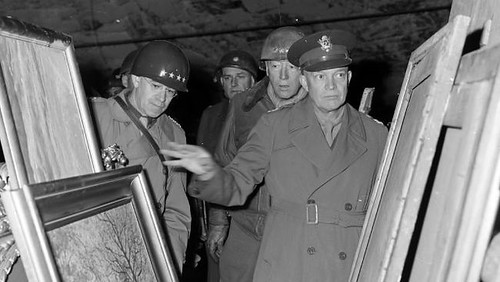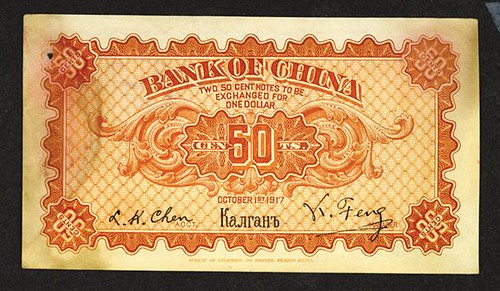
PREV ARTICLE
NEXT ARTICLE
FULL ISSUE
PREV FULL ISSUE
COLONEL BERNARD BERNSTEIN, RESTORER OF NAZI PLUNDER
This item could be titled "The WWII Medals That Weren't", as you'll see by the following comment by General George S.
Patton. This story from The Australian is old news, but provides interesting background on the recent tales of hidden Nazi gold.
-Editor

The three American generals — Dwight Eisenhower, Omar Bradley and George S. Patton — gazed in awe at the Nazi gold, more than 8000 gold bars and 2400 bags of gold coins, the largest hoard of stolen plunder ever assembled. “If these were the old freebooting days when a soldier kept his loot,” Bradley whispered to Patton, “you’d be the richest man in the world.” The date was April 10, 1945. Four days earlier, American troops had discovered the hoard in the Merkers mine northeast of Frankfurt: the entire reserves of the Berlin Reichsbank, gold, cash and treasure systematically stolen by the Nazi regime, and hidden underground 300km from Berlin to protect it from Allied bombing. The generals pondered what to do with it. Patton had a typically blunt idea: the gold should be cut up into medals, he said, and handed out to his troops, “one for every son-of-a-bitch in the Third Army”. But the Americans did not keep what they had found. Instead, it was itemised, packed up, guarded, and returned to survivors of the Holocaust, the families of victims and the people from whom it had been stolen, in one of the most remarkable and little-known operations of the war, carried out by an army bean-counter most people have never heard of. Nazi gold is back in the news after the discovery of a possible train buried in a Polish tunnel that may or may not be filled with treasure, if it exists. Certainly, stolen plunder went missing in the chaotic tail-end of the war — some of it, like the Amber Room, priceless. But thanks to a combination of precise German bookkeeping, Allied scruples and bureaucratic efficiency, the vast majority was found and restored to its rightful owners. The real story of Nazi gold is not how much was lost, but how much was saved. The Merkers mine hoard presented the US Army with a treasure trove of unprecedented proportions, and a major logistical headache. In addition to the 250 tonnes of gold, there were bales of foreign currency taken from the central banks of occupied countries, 2.7 billion in paper Reichsmarks, 400 tonnes of artworks and, grotesquely, piles of suitcases filed with gold and silver fillings, wedding rings and jewellery, the appalling pillage from the gas chambers. In Nazi hands, the loot could finance the war indefinitely. Merkers is in Thuringia, in what would soon be the Soviet zone, and the Americans were determined to prevent Stalin from getting hold of it. The treasure had to be made safe, and fast. The man tasked with cataloguing, guarding, shifting and preserving the treasure was an officer in the financial branch at Eisenhower’s headquarters: Colonel Bernard Bernstein, a New York lawyer and economist who had spent most of the war calculating currency exchange rates. Bernstein decided to transfer the entire trove to the Reichsbank building in Frankfurt, 140km away. A preliminary inventory of the gold, silver and currency (leaving aside the art) calculated the combined value at more than $US520 million, worth approximately $10bn today. Bernstein’s transfer of the hoard was a triumph of diligent accountancy and tight security. Jeeps with trailers hauled the gold out of the mine. At the entrance an officer registered each item, before the gold was loaded on to 30 10-tonne trucks; each truck number was noted down, along with names and serial numbers of the driver, assistant driver and guards. The convoy then set off, accompanied by five infantry platoons, two machinegun platoons, an anti-aircraft platoon with 10 mobile anti-aircraft guns, two squads of military police, an ambulance, four wreckers to move any roadblocks, and a squadron of Mustang fighters as air cover. This was not only the biggest bullion delivery ever made, but the most heavily guarded. Rumours began to circulate almost immediately that one of the trucks had been stolen en route, but there is no evidence that a single gold coin went astray. However, Bernstein was not content to leave it at that. Records recovered in the mine indicated that the Nazis had hidden treasure in other areas now under Allied control, “with the intent of maintaining a source of financing pro-Nazi activity”. These additional troves “should be ferreted out as soon as operations permit”, wrote Bernstein, who set out to do just that. Over the coming months he uncovered more gold and silver bars, American gold dollars, platinum and palladium. All of which, as Bernstein observed, could have been “used to perpetuate Nazism or contribute to the rebuilding of Nazi influence”. Some plunder undoubtedly slipped through the net, giving rise to the legend of undiscovered Nazi gold. Large sums were smuggled into foreign banks. But of the $US256m worth of gold shown in the closing balances of the Reichsbank’s precious metals department, 98.6 per cent was recovered. To read the complete article, see:
Dick Hanscom forwarded these Daily Mail articles with the latest of what passes for news on this topic. -Editor
A military spokesman told RMF FM radio that soldiers would not be moving into the area until after military experts had carried out a survey of the location where the train is said to have disappeared. He added that if the experts found something then specialised units would be brought in to begin excavation work, but that this was unlikely to happen until early Spring. In recent days, local authorities have shown they are less convinced and experts have called on them to 'end the madness' and start excavation work immediately. Mayor of Walbryzch Zygmunt Nowaczyk noted the only thing he had seen was 'an old map' and a letter – hardly rock solid proof. 'This is not the first and probably not the last such claim about an unusual discovery in our area,' he said. 'Walbrzych and Lower Silesia are full of secrets.' To read the complete articles, see:

Archives International Auctions, Part XXVIII A Live Internet-only auction. U.S. & Worldwide Banknotes, Scripophily, Coins & Security Printing Ephemera September 17th, 2015 beginning at 10:30 AM Eastern 
Click the links! Highlights include:
View the Virtual Catalog Download the Catalog in PDF format ARCHIVES INTERNATIONAL AUCTIONS, LLC 1580 Lemoine Avenue, Suite #7 Fort Lee, NJ 07024 Phone: 201-944-4800 Email: info@archivesinternational.com WWW.ARCHIVESINTERNATIONAL.COM Wayne Homren, Editor The Numismatic Bibliomania Society is a non-profit organization promoting numismatic literature. See our web site at coinbooks.org. To submit items for publication in The E-Sylum, write to the Editor at this address: whomren@gmail.com To subscribe go to: https://my.binhost.com/lists/listinfo/esylum All Rights Reserved. NBS Home Page Contact the NBS webmaster 
|